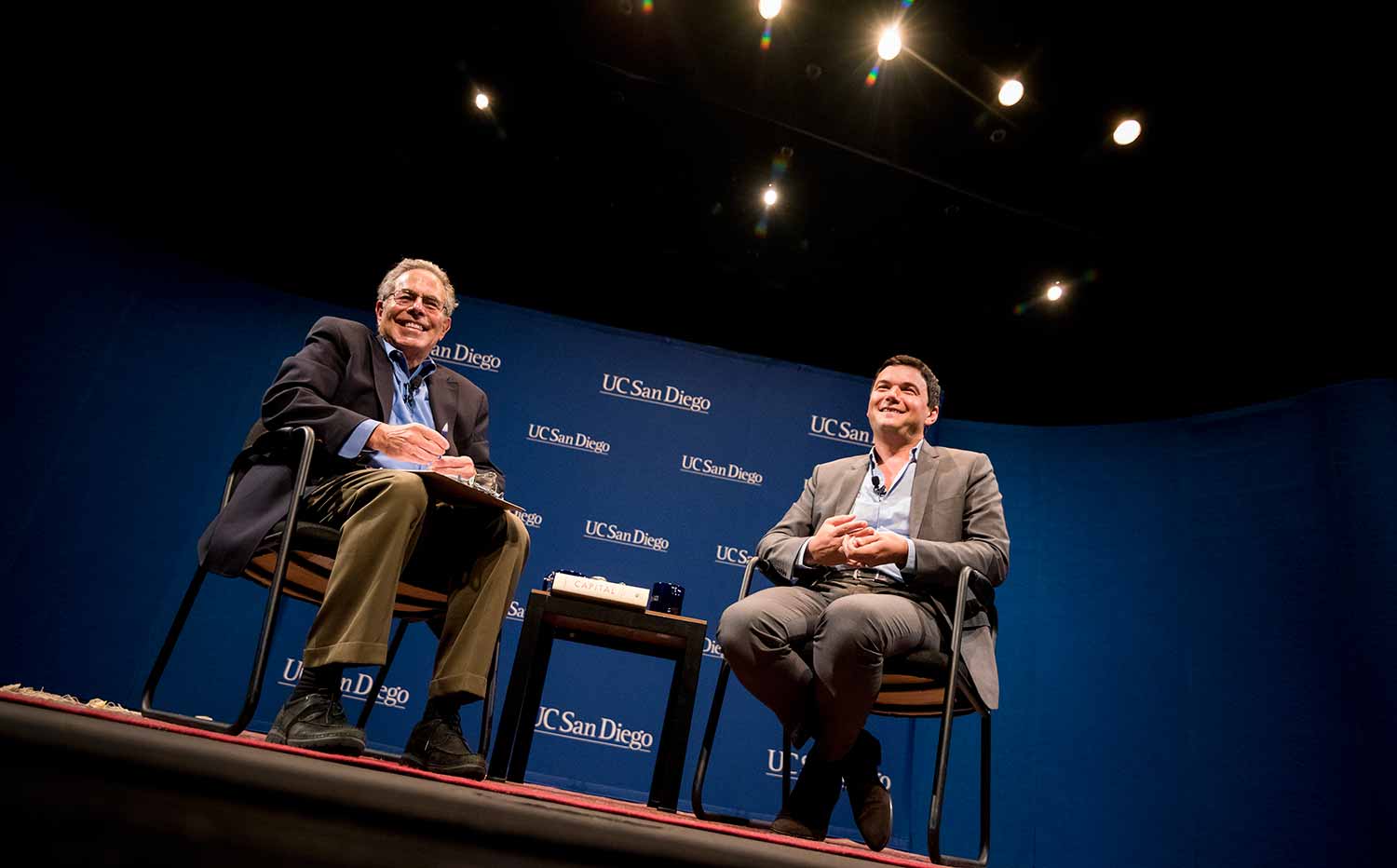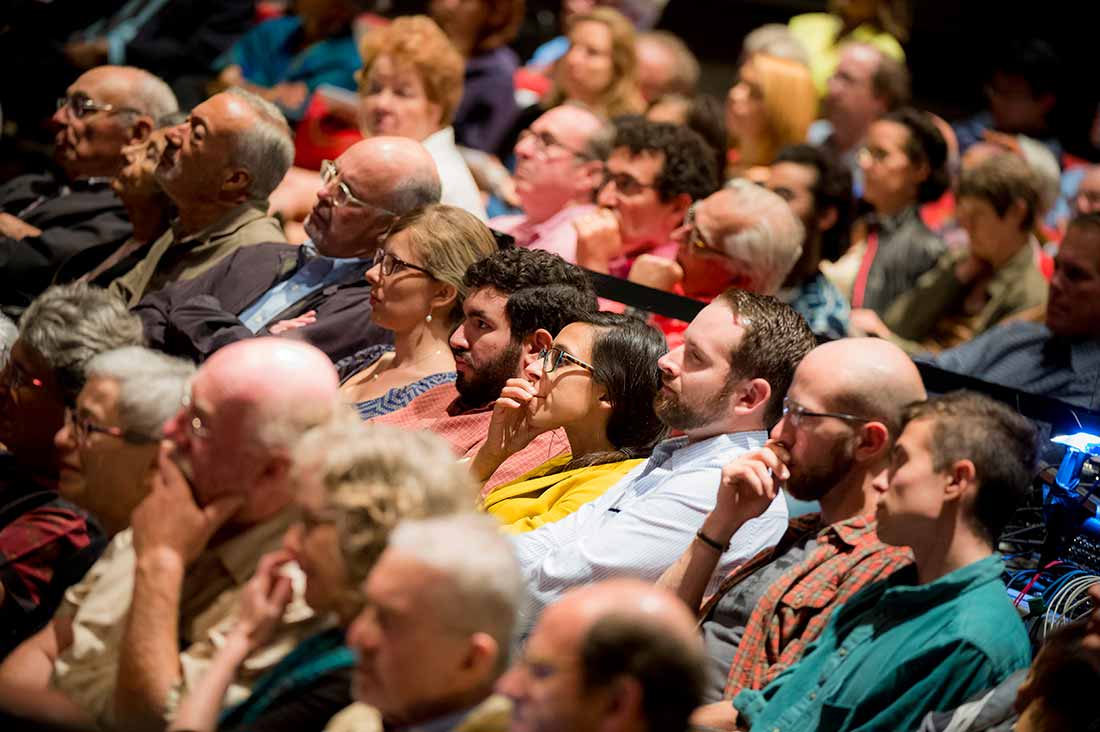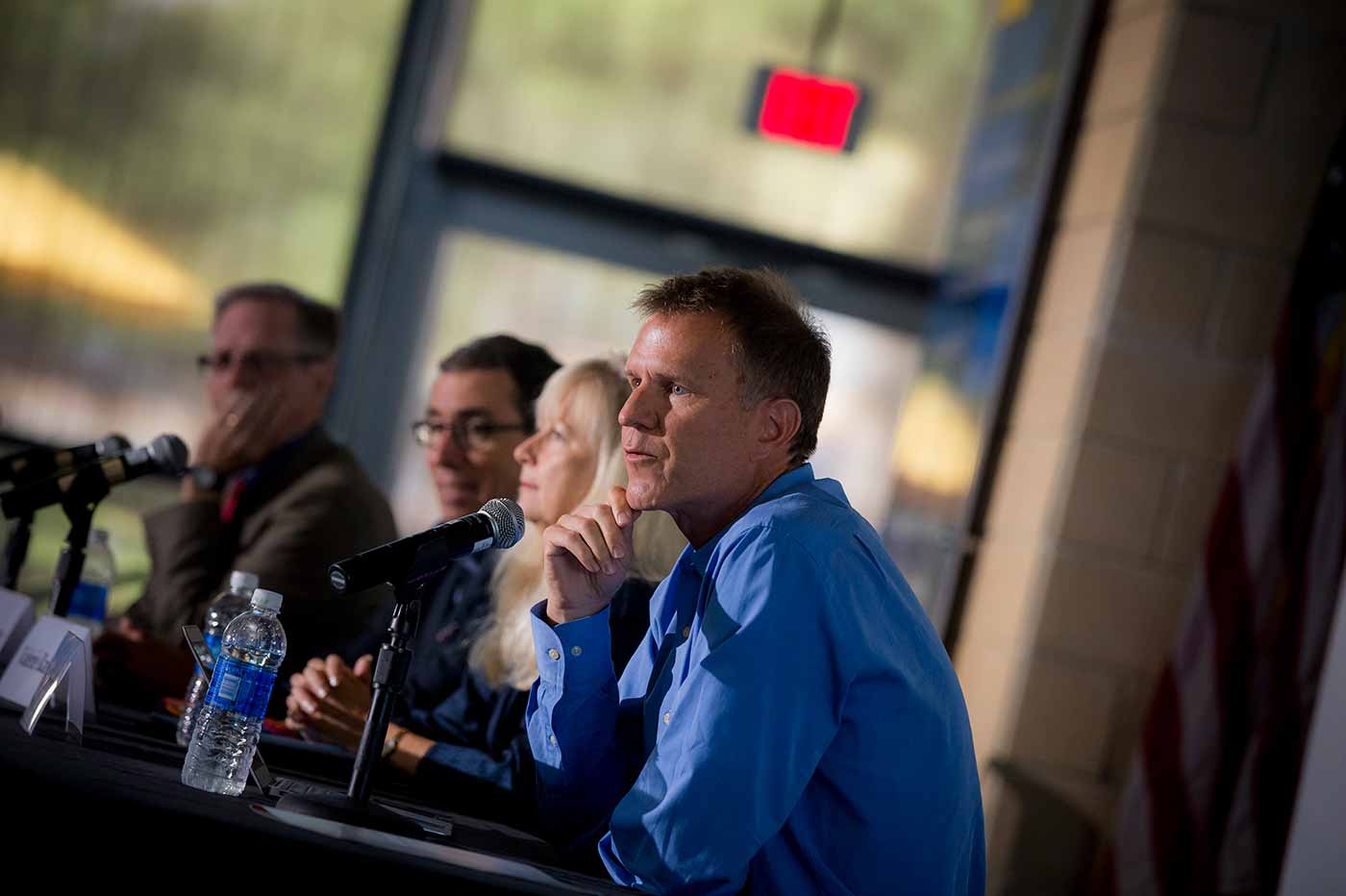By:
- Anthony King
Published Date
By:
- Anthony King
Share This:
Using History to Address Inequality
Renowned economist Thomas Piketty joins UC San Diego scholars in discussion on global income, wealth distribution

School of Global Policy and Strategy founding dean Peter Gourevitch (L) and Thomas Piketty take audience questions on income inequality Oct. 22. Photos by Erik Jepsen/UC San Diego Publications
A packed house at Mandeville Auditorium Oct. 22 welcomed Thomas Piketty, the French economics phenom who penned this decade’s most talked-about political book: “Capital in the Twenty-First Century.” Piketty, a professor at the Paris School of Economics, has been compared to such great economic thinkers as Adam Smith, John Maynard Keynes and Karl Marx. The main topic of Piketty’s work? Income inequality.
“Through exhaustive and painstaking research, Dr. Piketty, with the help of many colleagues around the world, was able to establish a historical trajectory of our income-inequality problem, outlining both its origins as well as its implications,” said Executive Vice Chancellor for Academic Affairs Suresh Subramani at the evening event, recorded by UCSD-TV and airing Nov. 16.

Distinguished Professor Emeritus of Political Science Peter Gourevitch joined Piketty in an hour-long conversation about the book, in part discussing how broader access to quality education and higher minimum-wage standards are tangible ways to address inequality in the United States. Piketty was speaking as part of the Helen Edison Lecture Series, organized by UC San Diego Extension.
“It’s not only a discussion of inequality, it’s a history of economic thought that takes [us] through how we understand growth,” Gourevitch said of the book. “This is a tremendously important topic that should be talked about. … [Piketty] has changed the debate in economics.”
“Capital in the Twenty-First Century” in part outlines rises in inequality through U.S. history, linking high capital return and low economic growth to income and wealth inequality. Particularly, political changes in the early 1980s led to a marked increase in inequality, and through the 2008 global financial crisis, disparities really took shape. For Piketty, understanding data throughout history is key to addressing the issue today.
“It’s important to take stock … and learn from this history,” Piketty said, acknowledging that more research needed to be done. “We still know too little about inequality. The book is a jumping off point.”
Several UC San Diego scholars met earlier that day for an all-day symposium attended by Piketty and Gourevitch. The day’s discussion was organized by the School of Global Policy and Strategy and its Center on Global Transformation, the Yankelovich Center for Social Science Research, and the Division of Social Sciences’ departments of Economics, Sociology and Political Science. The scholars not only highlighted work being done at UC San Diego, but also the reach of Piketty’s work.
During “The Causes of Inequality: Political, Social and Economic,” panel moderator Lane Kenworthy, professor of sociology and Yankelovich Chair in Social Thought, led a discussion that looked heavily at statistics and broad historical examples of inequality. Session panelists included Gordon Hanson of the School of Global Policy and Strategy, Gary Jacobson of the Department of Political Science, and Valerie Ramey of the Department of Economics.

Lane Kenworthy
“The role of the government in the U.S., in some sense, has been to allow inequality to emerge,” Hanson said, attributing rising wage inequality to skill-based technology changes, globalization, de-unionization and changes in tax policy.
Ramey, too, used history to explain inequality. She attributed the prosperity of the U.S. middle class in the 1950s and ‘60s in part to a lack of global competition. The solution she proposed: raise skills at the bottom.
The afternoon panel explored the social and political consequences of inequality. Political scientist Thad Kousser led philosopher Richard Arneson, sociologists Isaac Martin and Bud Mehan, and Tom Wong, also of political science. Each professor briefly explained their thoughts on the question of why and how inequality matters, tying it back to their research.
Martin said wealth distribution was slightly harder to measure than income distribution, because wealth includes more than wages and often promotes social exclusion. He said there is reason to believe wealth inequality is pulling the U.S. apart socially. Addressing racial inequality resonated with the audience, and was an important part of both Mehan’s discussion on access to high-quality education and Wong’s points regarding minorities in voting.
Throughout the day and into the evening, both Piketty and Gourevitch said addressing income inequality needs to continue on a global scale. Not only are there many ways to look at inequality, Piketty said, but different countries can learn from each other by offering up their data for research.
“The rise of inequality is important to the U.S., but also elsewhere. Each country has to find their own way to counteract income inequality,” Piketty said. “That’s why transparency and access to data is very important.”
Share This:
You May Also Like
Stay in the Know
Keep up with all the latest from UC San Diego. Subscribe to the newsletter today.



